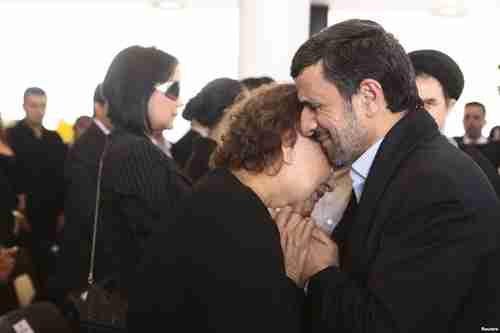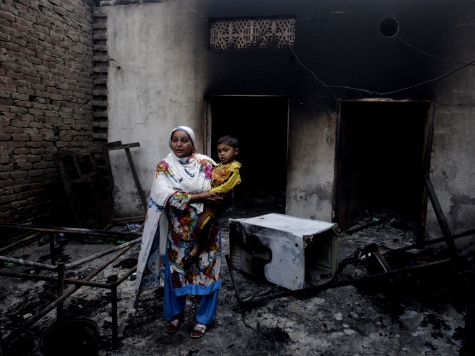
This morning’s key headlines from GenerationalDynamics.com
- Iran’s Mahmoud Ahmadinejad under fire for hugging Hugo Chávez’s mother
- U.S. rift with Afghanistan throws withdrawal strategy into doubt
- Withdrawal plans from Afghanistan’s Wardak province in limbo
- Lahore Pakistan turns into a war zone between Muslims and Christians
Iran’s Mahmoud Ahmadinejad under fire for hugging Hugo Chávez’s mother

Ahmadinejad hugs Chávez’s mother, Elena Frias, during funeral services on Friday (Reuters)
Iran’s president Mahmoud Ahmadinejad has come under criticism in Iranbecause he hugged Hugo Chávez’s mother, Elena Frias, to console her atChávez’s funeral on Friday. According to Islamic rules imposed byIran’s hardline Great Islamic Revolution survivors, unrelated men andwomen are not permitted to touch each other. Frias and Ahmadinejadheld hands. She appeared to be leaning on Ahmadinejad and crying. Inthe bitter political climate of Iran, and the personal enmity betweenAhmadinejad and Iran’s Supreme Leader, Ayatollah Ali Khamenei, a photoof the embrace is taking on a life of its own.
The hug comes a couple of days after a number of controversial remarksby Ahmadinejad in his eulogy of Chávez, where he said:
“I have no doubt that he [Chávez] will returnalongside Jesus Christ and the Mahdi [the Hidden Imam] toestablish peace and justice in the world.”
Ahmadinejad is a devout believer in the Mahdaviat — the Shia Muslimbelief that the Mahdi (or “the 12’th Imam” or “the Hidden Imam”) iscoming to save mankind. (See “28-Sep-12 World View — At U.N., Abbas and Netanyahu are combative, while Ahmadinejad invokes the Mahdi”) This beliefis roughly equivalent to the Christian belief in the second coming ofChrist, or the Buddhist belief in the Maitreya — that a new Buddha isto appear on earth, and will achieve complete enlightenment. In 2011,Ahmadinejad used his belief in the Mahdi to justify disobeying thesupreme leader Ayatollah Ali Khamenei. In Iran, Ahmadinejadfrequently refers to the imminent return of the Hidden Imam forpolitical purposes. Doing so again has drawn criticism from Tehranclerics. According to Ayatollah Khatami, “Logically, our presidentshould express his condolences. But I think it is not appropriate tomake it ideological.” RFE/RL and RFE/RL
U.S. rift with Afghanistan throws withdrawal strategy into doubt
Both the Taliban and Afghanistan’s president Hamid Karzai handedU.S. Defense Secretary Chuck Hagel stinging rebukes in the latter’sfirst visit to Afghanistan, forcing the cancellation of a schedulednews conference by Karzai and Hagel.
The Taliban have claimed responsibility for two coordinated suicidebombings in the cities of Kabul and Khost on Saturday morning. ATaliban spokesman said that the Kabul attack was “a message to Hagel,”to show that insurgents could strike even in one of the most heavilyguarded parts of the capital, a neighborhood of government buildingsand military bases with numerous checkpoints and blast walls.
However, the bitterly angry Karzai blamed the suicide bombings onAmerica, in cooperation with the Taliban:
“Taliban are every day in talks with America, but inKabul and Khost they set off bombs to show strength to America.They were in the service of the United States. They were in theservice of the rhetoric of ‘2014’. It was meant to scare us, [toshow] if they [foreign forces] are not here, ‘we will not leaveyou alone’. ..
Senior leaders of the Taliban and the Americans are engaged intalks in the Gulf state [of Qatar] on a daily basis.”
I understand Karzai’s convoluted logic to be the following: He’ssaying that America and the Taliban have been meeting secretly andconspiring against him (Karzai), and that the Taliban launched thesuicide bombings so that American troops would have a reason to remainin Afghanistan beyond the planned withdrawal date next year.
Hagel denied collusion with the Taliban. The U.S. and NATO commanderin Afghanistan, General Joseph Dunford, said:
“We have fought too hard over the past 12 years, wehave shed too much blood over the past 12 years, we have done toomuch to help the Afghan security forces grow over the last 12years to ever think that violence or instability would be to ouradvantage. …
I’ll let others judge whether [Karzai’s accusation] isparticularly helpful or not at the political level.”
Withdrawal plans from Afghanistan’s Wardak province in limbo
Two weeks ago, we reported that an angry Hamid Karzai had ordered that U.S. special forces immediatelyend all operations in Wardak province, the province adjacent to thecapital city Kabul. The reason for the demands was that Afghan forcesunder the command of the American special forces have been conductingtortures and murders in the region. Today (Monday) is the deadlinefor withdrawal, but the withdrawal is in limbo, suspended innegotiations. The Wardak situation was to be discussed between Hageland Karzai, but the meeting was canceled.
President Obama initiated the “surge” into Afghanistan in 2009 withthe intent of duplicating the success of President Bush’s “surge”strategy into Iraq in 2007. However, as I’ve written several times inthe past, the generational situation in Afghanistan is very differentthan in Iraq, and there are significant differences that will preventthe surge strategy from working there. (See “2-Sep-12 World View — U.S. decision on Haqqani Network will affect Pakistan relations”)
The Taliban are Sunni Pashtun militants. Even if they are inclinedto live peacefully in Afghanistan after the Americans leave,the Sunni Pashtun Taliban just across the border in Pakistan willnot let them.
From the point of view of Generational Dynamics, the biggest andmost important difference between Iraq and Afghanistan is thatIraq’s last generational crisis war was an external war (the Iran/Iraqwar, 1980-88), while Afghanistan’s last generational crisis war was a bloody,genocidal civil war (1991-96). That’s why the “surge” could work in Iraq,but not in Afghanistan: No negotiations will heal the animosity betweenthe Pashtuns and the Hazaras, who tortured, mutilated, raped andkilled each other less than 20 years ago.
It appears increasingly to me that Hamid Karzai, who is a Pashtunhimself, is in total denial about what’s going to happen to him and toAfghanistan after the Americans pull out. Inter Press Services News Agency
Lahore Pakistan turns into a war zone between Muslims and Christians
Police arrested 27 Christians in Lahore, Pakistan, on Sunday, aftermobs of Christian demonstrators battled police with stones, burnttires, and smashed car windows. The Christians were protesting ahorrific incident on Saturday, when hundreds of Muslims ransacked aChristian neighborhood in Lahore, and torched dozens of home, afterhearing a report that a Christian man had committed blasphemy againstMohammed. Blasphemy has become the touchstone for generationalattitudes and clashes in Pakistan that triggers the same kind of furyand violence that the Nazis had for the Jews. (See “3-Sep-12 World View — Pakistan girl to be freed after bizarre twist in blasphemy case” fromSeptember of last year.) On Saturday, the mob was armed with hammersand steel rods and broke into Christian houses, ransacked two churchesand burned Bibles and crosses. Accusations of blasphemy in Pakistancan prompt huge crowds to take the law into their own hands. Once anaccusation is made it’s extremely difficult to get it reversed, partlybecause law enforcement officials do not want to be seen as being softon blasphemers. Speaking out against the blasphemy laws can putpeople in danger. Two prominent politicians were assassinated in 2011for urging reform of the law. The killer of one of the politicians washailed as a hero, and lawyers at his legal appearances showered himwith rose petals. Independent (London) and The News International (Pakistan)
Permanent web link to this article
Receive daily World View columns by e-mail

COMMENTS
Please let us know if you're having issues with commenting.